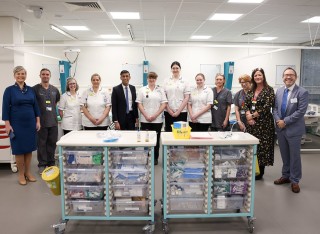
Jackie McBride
Academic and research departments
School of Health Sciences, Faculty of Health and Medical Sciences.About
Biography
As an adult nurse spanning over 25 years, my background has included acute medicine, critical care, outreach and practice development. Following this, I specialised in cancer working as Ward Sister within a large cancer centre and for Macmillan at network level working on a number of national projects.
I have been fortunate enough to have been involved in a number of strategic initiatives over the year locally and nationally in support of improvements in the delivery of patient care. There are two common themes in relation to my career developing innovative ways of working in support of quality patient care and influencing practice through research and learning and teaching.
I was initially appointed as a cancer tutor working across the School of Health Sciences across professional preparatory programmes and continuing professional development, and subsequently appointed as Head of Professional Preparatory Programmes.
University roles and responsibilities
- Practice Liaison Tutor Locality 5
I became an adult nurse to make a difference to the lives of my patients and improve the delivery of care across the sector, influencing policy change.
News
ResearchResearch interests
Research interests include the integration of technology within practice and the curriculum development.
Research interests
Research interests include the integration of technology within practice and the curriculum development.
Teaching
Undergraduate
I teach on the following courses:
My areas of teaching expertise are related to the development of innovative teaching and learning strategies across professional preparation programmes and continuing professional programmes. My subject areas are simulated practice communication skills, cancer care: pathophysiology and treatment and supportive care (chemotherapy nursing practice).
I am a dissertation supervisor and a personal tutor providing support for students in relation to their personal and professional development and pastoral needs.
Publications
Highlights
2001 Presentation on the “Reality of Outreach” delivered at the World Critical Care Conference Sydney, Australia.
2002 Co-authored article entitled “Setting up an Outreach Team in the UK”. Critical care Nursing in Europe (Vol 2 No 1 spring 2002).
2004 Co Authored article entitled “long term effects of introducing an early warning score on respiratory rate charting on general wards”. Resuscitation (65) 41-44 Elsevier.
2016: Co- authored article: Trajectories and predictors of state and trait anxiety in patients receiving chemotherapy for breast and colorectal cancer: results from a longitudinal study, European Journal of Oncology Nursing (24) 1-7 Elsevier.
Purpose/Objectives: To explore changes over time in self-efficacy and the predictive ability of changes in state anxiety and health-related quality of life during chemotherapy. Design: Secondary analysis of a longitudinal dataset derived from a larger, multicenter study. Setting: Outpatient oncology clinics across eight general hospitals in England, Scotland, and Northern Ireland. Sample: 137 patients scheduled to receive adjuvant chemotherapy for breast or colorectal cancer. Methods: At the beginning of each of six chemotherapy cycles, participants completed the Strategies Used by People to Promote Health questionnaire, the State-Trait Anxiety Inventory, and the Functional Assessment of Cancer Therapy–Breast or –Colorectal questionnaire. Multilevel model analysis was used to analyze longitudinal data, adjusted for demographic and clinical variables. Main Research Variables: Self-efficacy, anxiety, and health-related quality of life. Findings: No significant time effects were found for patients’ overall perceived self-efficacy or self-efficacy parameters. A trend toward greater self-efficacy was evident as chemotherapy progressed. Self-efficacy was significantly associated with decreased state anxiety throughout chemotherapy. Increases in overall self-efficacy and perceived ability to maintain a positive attitude were significantly associated with over-time increases in physical, emotional, and functional well-being, as well as with fewer cancer-related concerns. Conclusions: Findings highlight the importance of clinical assessments throughout treatment that focus on patients’ perceived self-efficacy as a positive regulator of mood and well-being. Implications for Nursing: The current study suggests self-efficacy enhancement should be a key component of psycho-behavioral programs designed to support patients with cancer throughout chemotherapy.
Purpose To examine the trajectories and predictors of state and trait anxiety in patients undergoing chemotherapy for breast or colorectal cancer. Methods Secondary analysis of data collected as part of a large multi-site longitudinal study. Patients with breast or colorectal cancer completed validated scales assessing their state and trait anxiety levels (State-Trait Anxiety Inventory) and symptom burden (Rotterdam Symptom Checklist) at the beginning of each chemotherapy cycle. Longitudinal mixed model analyses were performed to test changes of trait and state anxiety over time and the predictive value of symptom burden and patients’ demographic (age, gender) and clinical characteristics (cancer type, stage, comorbidities, ECOG performance status)Results Data from 137 patients with breast (60%) or colorectal cancer (40%) were analysed. Linear time effects were found for both state (χ 2=46.3 [df=3]; p




